(word完整版)初中英语常见副词及易错副词整理
中考词汇分类副词
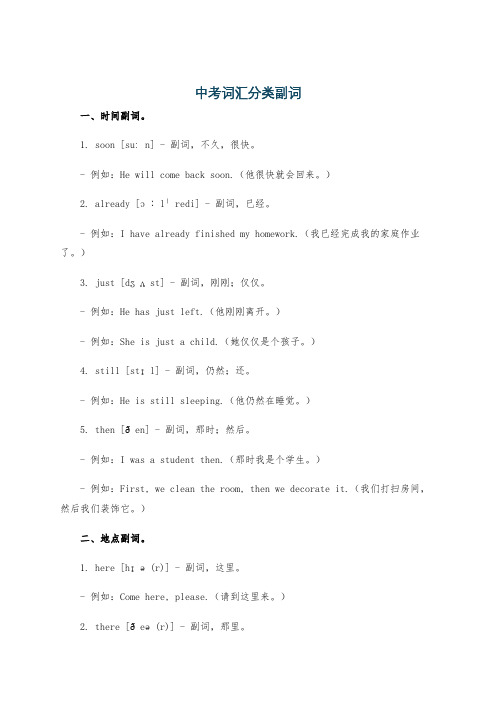
中考词汇分类副词一、时间副词。
1. soon [suːn] - 副词,不久,很快。
- 例如:He will come back soon.(他很快就会回来。
)2. already [ɔːlˈredi] - 副词,已经。
- 例如:I have already finished my homework.(我已经完成我的家庭作业了。
)3. just [dʒʌst] - 副词,刚刚;仅仅。
- 例如:He has just left.(他刚刚离开。
)- 例如:She is just a child.(她仅仅是个孩子。
)4. still [stɪl] - 副词,仍然;还。
- 例如:He is still sleeping.(他仍然在睡觉。
)5. then [ðen] - 副词,那时;然后。
- 例如:I was a student then.(那时我是个学生。
)- 例如:First, we clean the room, then we decorate it.(我们打扫房间,然后我们装饰它。
)二、地点副词。
1. here [hɪə(r)] - 副词,这里。
- 例如:Come here, please.(请到这里来。
)2. there [ðeə(r)] - 副词,那里。
- 例如:There is a book on the desk.(桌子上有一本书。
)3. everywhere [ˈevriweə(r)] - 副词,到处;处处。
- 例如:I can see flowers everywhere in spring.(在春天我到处都能看到花。
)4. nowhere [ˈnəʊweə(r)] - 副词,无处;哪里都不。
- 例如:There is nowhere to hide.(无处可藏。
)三、方式副词。
1. carefully [ˈkeəfəli] - 副词,仔细地;小心地。
- 例如:He reads the book carefully.(他仔细地读书。
(完整word版)英语中副词及用法
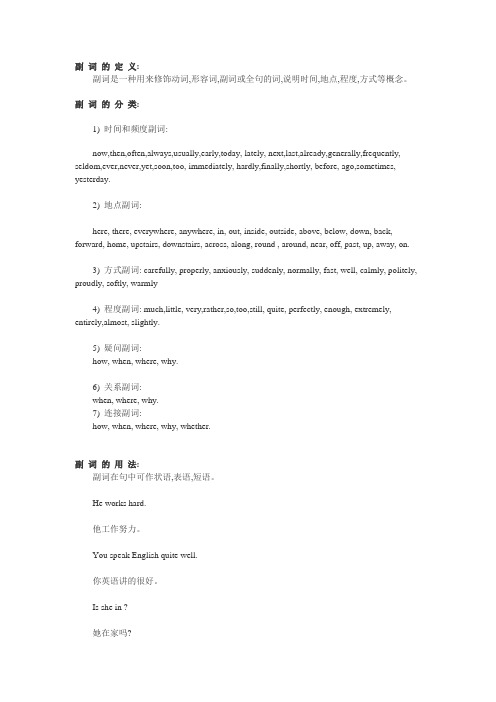
副词的定义:副词是一种用来修饰动词,形容词,副词或全句的词,说明时间,地点,程度,方式等概念。
副词的分类:1) 时间和频度副词:now,then,often,always,usually,early,today, lately, next,last,already,generally,frequently, seldom,ever,never,yet,soon,too, immediately, hardly,finally,shortly, before, ago,sometimes, yesterday.2) 地点副词:here, there, everywhere, anywhere, in, out, inside, outside, above, below, down, back, forward, home, upstairs, downstairs, across, along, round , around, near, off, past, up, away, on.3) 方式副词: carefully, properly, anxiously, suddenly, normally, fast, well, calmly, politely, proudly, softly, warmly4) 程度副词: much,little, very,rather,so,too,still, quite, perfectly, enough, extremely, entirely,almost, slightly.5) 疑问副词:how, when, where, why.6) 关系副词:when, where, why.7) 连接副词:how, when, where, why, whether.副词的用法:副词在句中可作状语,表语,短语。
He works hard.他工作努力。
初中副词知识点总结
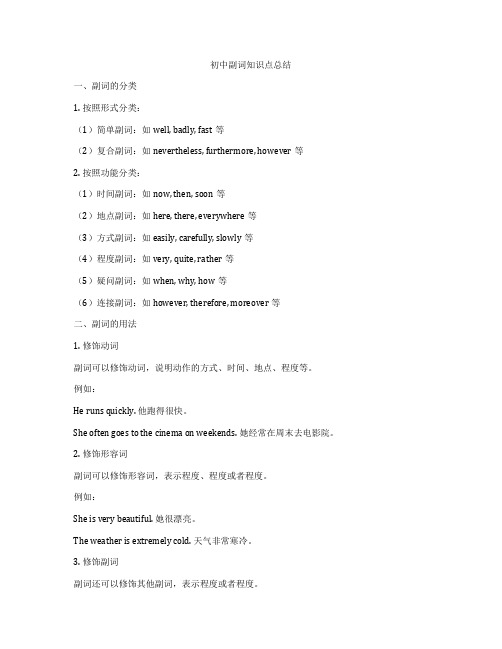
初中副词知识点总结一、副词的分类1. 按照形式分类:(1)简单副词:如well, badly, fast等(2)复合副词:如nevertheless, furthermore, however等2. 按照功能分类:(1)时间副词:如now, then, soon等(2)地点副词:如here, there, everywhere等(3)方式副词:如easily, carefully, slowly等(4)程度副词:如very, quite, rather等(5)疑问副词:如when, why, how等(6)连接副词:如however, therefore, moreover等二、副词的用法1. 修饰动词副词可以修饰动词,说明动作的方式、时间、地点、程度等。
例如:He runs quickly. 他跑得很快。
She often goes to the cinema on weekends. 她经常在周末去电影院。
2. 修饰形容词副词可以修饰形容词,表示程度、程度或者程度。
例如:She is very beautiful. 她很漂亮。
The weather is extremely cold. 天气非常寒冷。
3. 修饰副词副词还可以修饰其他副词,表示程度或者程度。
例如:She sings quite beautifully. 她唱得相当漂亮。
I am almost never late. 我几乎从不迟到。
4. 修饰整个句子副词还可以修饰整个句子,表示说话者的态度、观点或行动。
例如:Certainly, I will help you. 当然,我会帮助你。
Unfortunately, it rained on the day of the picnic. 不幸的是,野餐那天下雨了。
5. 位置副词一般放在被修饰的词语之后,若要修饰整个句子则通常放在句首或句尾。
例如:She speaks English fluently. 她英语说得流利。
七年级英语副词知识点归纳
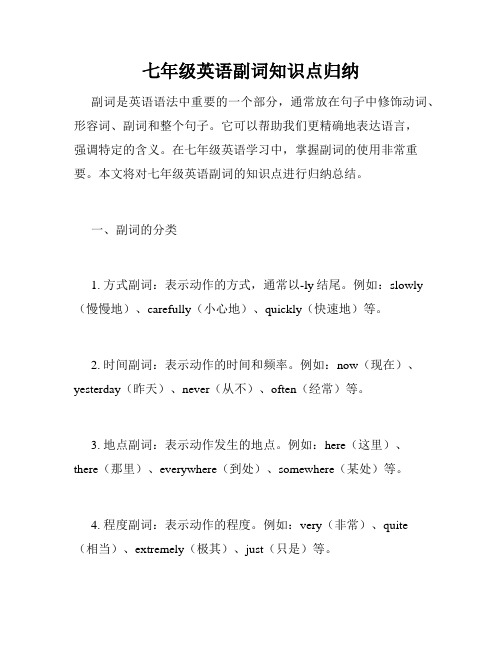
七年级英语副词知识点归纳副词是英语语法中重要的一个部分,通常放在句子中修饰动词、形容词、副词和整个句子。
它可以帮助我们更精确地表达语言,强调特定的含义。
在七年级英语学习中,掌握副词的使用非常重要。
本文将对七年级英语副词的知识点进行归纳总结。
一、副词的分类1. 方式副词:表示动作的方式,通常以-ly结尾。
例如:slowly (慢慢地)、carefully(小心地)、quickly(快速地)等。
2. 时间副词:表示动作的时间和频率。
例如:now(现在)、yesterday(昨天)、never(从不)、often(经常)等。
3. 地点副词:表示动作发生的地点。
例如:here(这里)、there(那里)、everywhere(到处)、somewhere(某处)等。
4. 程度副词:表示动作的程度。
例如:very(非常)、quite(相当)、extremely(极其)、just(只是)等。
二、副词的使用1. 位置:通常放在动词之后,如:She sings well.(她唱得好。
)但是如果修饰整个句子,则放在句首或结尾。
例如:Luckily, I found my keys.(幸运的是,我找到了我的钥匙。
)2. 修饰形容词:例如:He is extremely handsome.(他非常帅气。
)3. 修饰副词:例如:She speaks English very well.(她英语说得非常好。
)4. 修饰整个句子:例如:Fortunately, the weather is good.(幸运的是,天气很好。
)三、副词的比较级和最高级1. 比较级:用于表示两个事物之间的比较。
一般在形容词和副词后面加-er或-more。
例如:She sings more beautifully than her sister.(她唱歌比她妹妹更好听。
)2. 最高级:用于表示三个或三个以上事物之间的比较。
一般在形容词和副词前面加the most或the -est。
人教版九年级英语副词表
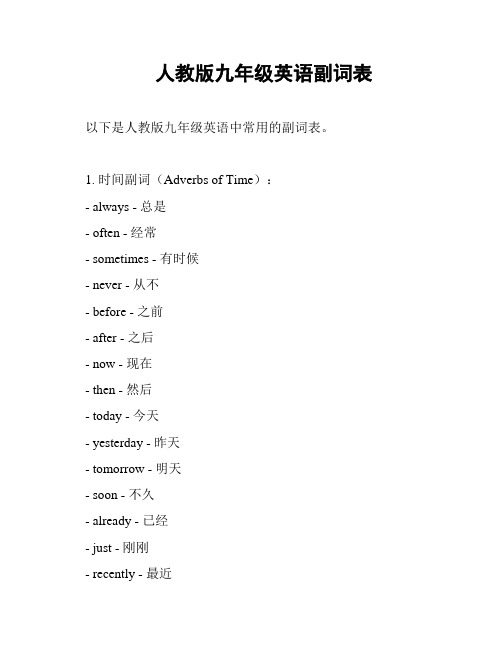
人教版九年级英语副词表以下是人教版九年级英语中常用的副词表。
1. 时间副词(Adverbs of Time):- always - 总是- often - 经常- sometimes - 有时候- never - 从不- before - 之前- after - 之后- now - 现在- then - 然后- today - 今天- yesterday - 昨天- tomorrow - 明天- soon - 不久- already - 已经- just - 刚刚- recently - 最近- ever - 曾经2. 地点副词(Adverbs of Place):- here - 这里- there - 那里- everywhere - 到处- nowhere - 无处- outside - 外面- inside - 里面- upstairs - 楼上- downstairs - 楼下- nearby - 附近- far - 远3. 方式副词(Adverbs of Manner):- well - 好地- badly - 坏地- slowly - 慢慢地- quickly - 快速地- carefully - 小心地- happily - 快乐地- loudly - 大声地- quietly - 安静地- easily - 容易地- hard - 努力地4. 程度副词(Adverbs of Degree):- very - 非常- extremely - 极其- quite - 相当- too - 太- enough - 足够- nearly - 几乎- almost - 差不多- even - 甚至- just - 只是5. 频率副词(Adverbs of Frequency):- always - 总是- usually - 通常- often - 经常- sometimes - 有时候- never - 从不- rarely - 很少- seldom - 很少- occasionally - 偶尔- hardly ever - 几乎不- once - 一次这些副词在句子中用来修饰动词、形容词或其他副词,增强句子的表达力和准确性。
中考英语必会的70个副词
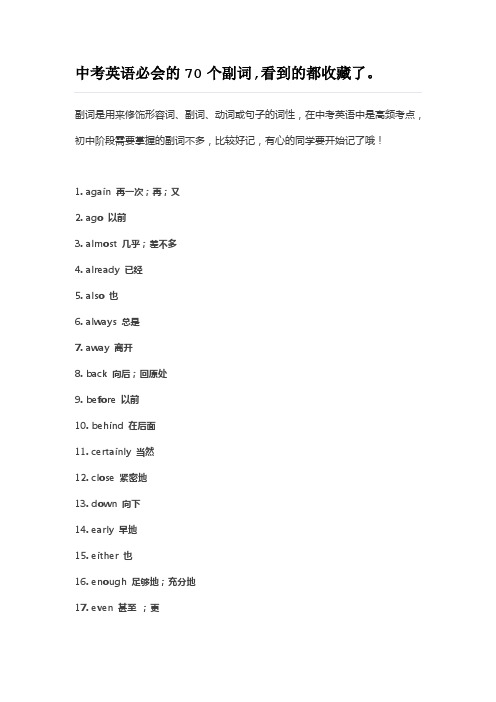
中考英语必会的70个副词,看到的都收藏了。
副词是用来修饰形容词、副词、动词或句子的词性,在中考英语中是高频考点,初中阶段需要掌握的副词不多,比较好记,有心的同学要开始记了哦!1. again 再一次;再;又2. ago 以前3. almost 几乎;差不多4. already 已经5. also 也6. always 总是7. away 离开8. back 向后;回原处9. before 以前10. behind 在后面11. certainly 当然12. close 紧密地13. down 向下14. early 早地15. either 也16. enough 足够地;充分地17. even 甚至;更18. ever 曾经;无论何时19. everywhere 到处20. far 远地21. fast 快地22. first 最初23. hard 努力地;(下雨/ 下雪等)猛烈地24. hardly 几乎不25. here 这里;在这里;向这里26. home 回家;到家27. how 怎样;多么28. in 在家;向内29. instead 相反30. just 正好;刚刚;仅31. late 迟地;晚地32. later 之后;后来33. left 向左34. little 几乎不35. loud 大声地36. much 非常37. neither 也不38. never 决不;从来不39. not 不40. now 现在41. off 离开,掉落42. often 经常43. on 进行中44. once 从前45. only 只;仅仅46. over 结束47. perhaps 可能;也许48. quickly 快地;迅速地49. quite 完全;十分50. rather 相当;宁可51. really 真正地;确实52. since 自从那时以来53. slowly 慢地54. so 如此55. sometimes 有时56. soon 很快;不久57. still 仍然;还58. suddenly 突然59. then 那时;然后60. there 在(往)那儿;表示“存在”61. today 今天;现今62. together 一起63. tomorrow 明天64. tonight 今天晚上65. too 也;太66. twice 两次;两倍67. usually 通常68. very 很;非常69. well 好地70. when 在什么时候71. where 在(往)哪里72. why 为什么73. yes 是74. yet 还;仍然;但是。
(完整版)人教版初中英语各单元副词知识点汇总表
(完整版)人教版初中英语各单元副词知识点汇总表人教版初中英语各单元副词知识点汇总表Unit 1: School Life- Adverbs of frequency: always, usually, often, sometimes, rarely, never- Adverbs of manner: carefully, happily, quickly, slowly, wellUnit 2: Personal Information- Adverbs of time: now, then, tomorrow, yesterday, soon, already - Adverbs of place: here, there, everywhere, nowhereUnit 3: Hobbies- Adverbs of degree: very, quite, too, enough, extremely- Adverbs of frequency: frequently, occasionally, seldomUnit 4: Food and Drinks- Adverbs of manner: well, badly, fast, slowly, neatly- Adverbs of place: at, in, on, up, downUnit 5: Daily Routine- Adverbs of frequency: always, often, sometimes, rarely, never - Adverbs of time: now, then, today, yesterday, soon, alreadyUnit 6: Travel and Transportation- Adverbs of frequency: usually, occasionally, seldom, never - Adverbs of manner: nicely, safely, easilyUnit 7: Festivals and Celebrations- Adverbs of time: soon, then, now, before, after, tonight- Adverbs of place: here, there, somewhere, anywhereUnit 8: Technology- Adverbs of manner: well, carefully, quickly, slowly- Adverbs of frequency: often, occasionally, seldom, neverUnit 9: Jobs and Careers- Adverbs of time: now, then, soon, already, today, tomorrow- Adverbs of degree: very, quite, extremely, enoughUnit 10: Environment- Adverbs of manner: properly, effectively, responsibly- Adverbs of frequency: always, often, sometimes, seldom, neverUnit 11: Health and Fitness- Adverbs of manner: well, badly, fast, slowly, easily- Adverbs of time: now, then, soon, already, yesterdayUnit 12: Emotions- Adverbs of degree: very, extremely, quite, enough- Adverbs of frequency: always, usually, rarely, neverUnit 13: Shopping- Adverbs of manner: well, carefully, quickly, slowly, easily- Adverbs of place: here, there, everywhere, somewhereUnit 14: Nature- Adverbs of time: now, then, yesterday, soon, already- Adverbs of degree: very, quite, extremely, enoughUnit 15: Science and Technology- Adverbs of manner: carefully, quickly, slowly, well- Adverbs of frequency: often, sometimes, rarely, never以上是关于人教版初中英语各单元副词知识点汇总表的内容,希望对你有所帮助!。
人教版九年级英语全一册 副词表
人教版九年级英语全一册副词表本文档包含人教版九年级英语全一册中涉及的常见副词和例句,供研究和参考。
一、时间副词1. now (现在)- He is busy now.2. then (那时)- We were in the park then.3. recently (最近)- I have recently started learning Spanish.4. already (已经)- Have you already finished your homework?5. soon (很快)- She will be here soon.6. never (从不)- He never goes out on Saturday nights.二、地点副词1. here (这里)2. there (那里)- He is not there anymore.3. everywhere (到处)- The flowers are blooming everywhere.4. nowhere (无处)- I can find the book nowhere.5. abroad (国外)- She has been working abroad for two years.三、方式副词1. carefully (仔细地)- He read the instructions carefully.2. quickly (快速地)- She finished the race quickly.3. slowly (慢慢地)- He walked slowly in the park.4. quietly (安静地)- The students were working quietly in the classroom.5. loudly (大声地)- He shouted loudly in excitement.四、频率副词1. always (总是)- She always helps her friends when they need her. 2. often (经常)- He often goes to the gym after work.3. sometimes (有时候)- Sometimes it rains heavily in summer.4. never (从不)- He never drinks coffee before bedtime.5. rarely (很少)- I rarely eat fast food.五、程度副词1. very (非常)- The movie was very interesting.2. quite (相当)- The exam was quite difficult.3. too (太)- It's too cold to go swimming today.4. so (如此)- The pizza was so delicious that I ate too much.5. enough (足够)- She is old enough to start driving.六、疑问副词1. why (为什么)- Why did you quit your job?2. when (什么时候)3. where (在哪里)- Where is the nearest hospital?4. how (如何)- How did you learn to play the piano?5. what (什么)- What is your favorite color?七、连接副词1. however (然而)- He is not very intelligent. However, he is a hard worker.2. therefore (因此)- He didn't study and therefore he failed the test.3. otherwise (否则)- Please turn off the lights, otherwise the battery will die.4. moreover (此外)- She is very smart. Moreover, she is kind-hearted.5. nevertheless (然而)- The weather is bad. Nevertheless, I will go for a walk.以上是人教版九年级英语全一册中常见的副词和例句,希望对大家有所帮助。
初中英语1600词中的103个副词
初中英语1600词中的103个副词初中英语1600词中,副词有103个。
其中,50个是单纯的副词,只有一个词性。
另外53个是跨词类单词,除了是福此外,还可能是介词、连词、形容词或代词。
【第一部分】50个副词(单词性)abroad[əˈbrɔːd]ad.到(在)国外again[əˈɡeɪn]ad.再一次;再,又ago [əˈɡəʊ]ad.以前almost [ˈɔːlməʊst]ad.几乎,差不多aloud[əˈlaʊd]ad.大声地already [ɔːlˈredɪ]ad.已经also [ˈɔːlsəʊ]ad.也always [ˈɔːlweɪz]ad.总是;一直;永远anyway[ˈenɪ]ad.不管怎样anywhere [ˈenɪweə]ad.任何地方away [əˈweɪ]ad.离开downstairs [ˈdaʊnsteəz]ad.在楼下;到楼下else [els]ad.别的,其他的especially [ɪˈspeʃəlɪ]ad.特别,尤其even[ˈiːv(ə)n]ad.甚至,连(……都);更ever [ˈevə(r)]ad.曾经;无论何时everywhere [ˈevrɪweə(r)]ad.到处forward [ˈfɔːwəd]ad.将来,今后;向前,前进hardly [ˈhɑːdlɪ]ad.几乎不how[haʊ]ad.怎样,如何;多少;多么immediately [ɪˈmiːdɪətlɪ]ad.立即instead[ɪnˈsted]ad.代替,顶替maybe [ˈmeɪbiː]ad.可能,大概,也许nearly [ˈnɪəlɪ]ad.将近,几乎never [ˈnevə(r)]ad.决不,从来没有not [nɔt]ad.不,没now [naʊ]ad.现在often [ˈɔf(ə)n; (US) ˈɔːfn]ad.经常,常常OK[əʊˈkeɪ]ad.(口语)好,对,不错only [ˈəʊnlɪ]ad.仅仅,只,才out [aʊt]ad.外出,在外;向外;熄perhaps [pəˈhæps]ad.可能,或许probably[ˈprɔbəb(ə)lɪ]ad.很可能,大概quite [kwaɪt]ad.完全,十分rather [ˈrɑːðə; (US) ˈræðər]ad.相当,宁可seldom [ˈseldəm]ad.很少,不常slow[sləʊ]ad.慢慢地,缓慢地sometimes[ˈsʌmtaɪmz]ad.有时somewhere[ˈsʌmweə]ad.在某处soon [suːn]ad.不久,很快,一会儿still [stɪl]ad.仍然,还then [ðen]ad.当时,那时;然后;那么(通常用于句首或句尾)together [təˈgeðə]ad.一起,共同too [tuː]ad.也,还;又;太,过分;很,非常twice [twaɪs]ad.两次;两倍upstairs [ʌpˈsteəz]ad.在楼上,到楼上very [ˈverɪ]ad.很,非常where [weə(r); (US) hweər]ad.在哪里,往哪里yes[jes]ad.是,好,同意yet [jet]ad.尚,还,仍然【第二部分】53个除了是副词外,还兼具其他词类的副词about [əˈbaʊt]ad.大约;到处;四处prep.关于;在各处;四处after [ˈɑːftə(r)]ad.在后;后来prep.在……之后;在……后面conj.在……以后all [ɔːl]ad.全部地a.全(部);所有的;总;整pron.全部;全体成员along [əˈlɔŋ; (US) əˈlɔŋ]ad.向前;和…..在一起;一同prep.沿着;顺着around [əˈraʊnd]ad.在周围;在附近Prep.在……周围;大约as[əz,æz]ad.&conj.像……一样;如同;因为Prep.作为,当作back [bæk]ad.回(原处);向后a.后面的n.背后;后部;背before[bɪˈfɔː(r)]prep.在……以前;在……前面ad.以前conj.在…..之前behind [bɪˈhaɪnd]prep.(表示位置)在……后面ad.在后面;向后besides[bɪˈsaɪdz]prep.除……以外(还有)ad.还有,此外daily [ˈdeɪlɪ]a.每日的;日常的ad.每天n.日报deep [diːp]a.深的; ad.深;深厚down [daʊn]prep.沿着,沿……而下ad.向下early [ɜːlɪ]a.早的ad.早地east [iːst]a.东方的;东部的;朝东的;从东方来的在东方;向东方;从东方ad.东,东方;n.东部either [ˈaɪðə(r)]a.两方任一方的;二者之一;conj.二者之一;要么……ad.(用于否定句或短语后)也enough [ɪˈnʌf]a.足够的;充分的ad.足够地;充分地far(father,farthest; further,furthest) [fɑː]a.&ad.远的;远地fast [ˈfɑːst]a.快的,迅速的;紧密的ad.很快地,迅速地;紧密地first [fɜːst]num.第一a.&ad.第一;首次;最初great [ɡreɪt]a.伟大的;重要的;好极了ad.(口语)好极了,很好hard [hɑːd]ad.努力地;使劲;猛烈地a.硬的;困难的;艰难的here [hɪə(r)]ad.这里,在这里;向这里home[həʊm]n.&ad.家;家;回家however [haʊˈevə(r)]ad.&conj可是;然而;尽管如此’just[dʒʌst]ad.刚才;恰好;不过;仅a.公正的late [leɪt]a.晚的,迟的ad.晚地,迟地low [ləʊ]a.& ad.低;矮more(much或many的比较级) [mɔː(r)]a.&ad.另外的;附加的;较多的;另外;而且;更n.更多的量;另外的一些next [nekst]a.最近的;紧挨着的,隔壁的;下一次ad.随后,然后,下一步no[nəʊ]ad.不,不是a.没有,无,不off [ɔːf]prep.离开,脱离,(走)开ad.离开;(电,自来水)停了,中断once[wʌns]n.&ad.一次,一度,从前;conj.一旦outside [aʊtˈsaɪd]n.外面ad.在外面prep在……外面over [ˈəʊvə(r)]prep在……上方;越过;遍及ad.翻到,遍布;越过;结束past [pɑːst; (US) pæst]ad.过n.过去,昔日,往事prep.过……,走过某处quick[kwɪk]a.快的,敏捷的ad.快地,敏捷地right [raɪt]n.权利a.对,正确的ad.正确地,恰恰,完全地a.右,右边的round [raund]ad.转过来prep.环绕一周,围着a.圆的;球形的since[sins]ad.从那时以来conj.从……以来,……以后,由于prep.从……以来so [səʊ]ad.如此,这么,非常;同样conj.因此,所以such[sʌtʃ]]ad.那么pron.(泛指)人,事物a.这样的,那样的sure [ʃʊə(r),ʃɔː(r)]a.确信,肯定口ad.(口语)的确,一定,当然there [ðeə(r)]int.那!你瞧(表示引起注意)n.那里,那儿ad.在那里,往那里;(作引导词)表示“存在”through [θruː] prep.穿(通)过;从始至终ad.穿(通)过;自始至终,全部today[tədei]ad.& n.今天;现在,当前tomorrow [təˈmɔrəʊ]ad.& n.明天tonight [təˈnaɪt]ad.& n.今晚,今夜up [ʌp]ad.向上;在上方;起来;在……以上prep.向(高处);向(在)……上(面)游well(better, best) [wel]ad.好a.好的,健康的int.表示惊讶、同意when [wen]conj.当……的时候ad.什么时候,何时why [waɪ; (US) hwaɪ]ad.&int.为什么yesterday [ˈjestədeɪ]n.&ad.昨天。
【英语】副词知识点总结(word)
【英语】副词知识点总结(word)一、初中英语副词1.I don't know what her hobbies are because we talk about work when we meet.A. SometimesB. neverC. alwaysD. seldom【答案】 C【解析】【分析】句意:我不知道她的爱好是什么,因为我们见面时总是谈论工作。
A.sometimes 有时;B.never从不;C.always 总是;D.seldom 很少。
结合句意可知,不知道爱好是因为见面时谈论工作更多,频率较高用always,答案为C。
【点评】此题考查副词的辨析。
2.—__________do you sleep every day, Eric?—For about eight hours.A. How muchB. How fastC. How oftenD. How long【答案】 D【解析】【分析】句意:——艾瑞克,你每天晚上睡多长时间?——大约八个小时。
A.多少;B.多快;C.多长时间一次;D.多长。
根据答语For about eight hours. 可知问句询问的是时间长短,对时间长短提问应使用how long,故答案是D。
【点评】考查疑问词辨析,根据答语确定疑问词的意思,从而选出正确答案。
3.-- Do you like going mountain climbing?-- Yes. I______ do it on weekends with my friends.A. seldomB. oftenC. never【答案】 B【解析】【分析】句意为:---你喜欢爬山吗?---喜欢。
我周末经常和朋友去爬山。
seldom:极少、几乎不;often:经常;never:从来不。
根据语境可知,这里的回答是肯定的,故应选B。
4."Left—behind" children _________see their parents, because their parents work in the cities, leaving them behind in the countryside to be cared for by their grandparents.A. alwaysB. hardly everC. Often【答案】 B【解析】【分析】句意:留守儿童几乎不曾看见他们的父母,因为他们的父母在大城市工作,把他们留在农村被爷爷奶奶照顾。
- 1、下载文档前请自行甄别文档内容的完整性,平台不提供额外的编辑、内容补充、找答案等附加服务。
- 2、"仅部分预览"的文档,不可在线预览部分如存在完整性等问题,可反馈申请退款(可完整预览的文档不适用该条件!)。
- 3、如文档侵犯您的权益,请联系客服反馈,我们会尽快为您处理(人工客服工作时间:9:00-18:30)。
一、副词的分类
副词按词汇意义可分为:
方式副词:well,fast,slowly,carefully,quickly,suddenly,
程度副词:very, much, enough, almost, rather, quite, too,so
地点副词:here,there,out,outside, inside, upstairs, somewhere,abroad, home, near, away, back, 时间副词:today,early,soon,now,then,recently,still, yesterday, before, ago, immediately, lately, already, yet
频度副词:always,often,usually,sometimes,seldom,ever, never
否定副词:no,not,neither,nor,
疑问副词:where, how, why, how, how long其他:also,too,only
二,
注意下列副词的不同含义(一些副词与形容词同型,表示具体的含义)
high高地highly高度地wide宽的widely广泛的
deep深地deeply深深地close近地closly仔细地,严密地
1,He opened the door .(wide, widely)
2, English is in the world. (wide, widely)
3, He is sitting to me.(close, closely)
4, Watch him (close, closely)
5, The plane was flying .(high, highly)
6, I think of your opinion. (high, highly)
7, He pushed the stick into the mud.(deep, deeply)
7, Even father was moved by that film. (deep, deeply)
两种形式的副词含义迥异。
late迟,晚lately最近hard努力的,艰苦地hardly几乎不
just刚刚,仅仅,恰好justly公正地,正当地
most很,最mostly主要地almost几乎,差不多
三,其它副词比较:
1, already与yet的区别already用于肯定句句中,表示“已经”;
yet用于否定句句末,表示“还”,用于疑问句句末,表示“已经”
例如,He had already left when I called.当我给他打电话时,他已经离开了。
Have you found your ruler yet?你已经找到你的尺子了吗?
I haven’t finished my homework yet.我还没有完成作业。
注意:already还可以表示惊奇,惊讶等语气,常用于疑问句句末
例如:Has your son gone to school already?你的儿子已经上学了吗?(表示很惊讶)
2, very,much和very much.的区别
very用于修饰形容词或副词的原级;much用于修饰形容词或副词的比较级;修饰动词
要用very much.
例如,John is very honest.约翰非常诚实。
This garden is much bigger than that one.这个花园比那个大的多。
Thank you very much.非常感谢你
3.so与such的区别
⑴so修饰形容词或副词;such修饰名词,
例如,My brother runs so fast that I can’t follow him.我弟弟跑得那么快以至于我跟不上他。
He is such a boy.他是一个这样的孩子。
⑵so修饰的形容词后可以有一个单数的可数名词,其结构是“so+形容词+a/an+可数名词单数”.
such可以修饰可数名词单复数和不可数名词,名词前可以有形容词作定语,其结构是“such+a/an+形容词+可数名词单数”,“such+形容词+可数名词复数/不可数名词”,
例如,He is so clever a boy.=He is such a clever boy.他是一个如此聪明的孩子。
It is such cold weather.这么冷的天气。
(正)
It is so cold weather.(误)
They are such good students.他们是那么好的学生。
(正)
They are so good students. (误)
⑶如果可数名词复数前有many,few或不可数名词前有much,little修饰,用so不用such.
例如,so many(如此多的);so few(如此少的)可以加可数名词复数
so much(如此多的);so little(如此少的)可以加不可数名词
4.also,too,as well与either的区别
also,as well,too,用于肯定句,also常用于be动词,情态动词,助动词之后,行为动词之前;as well,too用于句末;either用于否定句中,置于句末。
例如,My father is a teacher. My mother is also a teacher.
=My father is a teacher. My mother is a teacher as well.
=My father is a teacher. My mother is a teacher,too.我爸爸是一名老师,我妈妈也是。
I can’t speak French.. Jenny can’t speak French,either.我不会说法语,詹妮也不会。
5.sometime,sometimes,some time与some times的区别
sometime:某一时间,某一时刻,可指将来时,也可指过去时
sometimes:有时,不时的
some time:一段时间
some times:几次,几倍
.例如,We’ll have a test sometime next month.下个月的某一时间,我们要进行一次测试。
Sometimes we are busy and sometimes we are not.有时我们很忙,有时不忙。
He stayed in Beijing for some time last year.他去年在北京呆了一段时间。
I have been to Beijing some times.我去过北京好几次。
6.ago与before的区别
ago表示以现在为起点的“以前”,常与一般过去时连用,不可以单独使用。
before指过去或将来的某时刻“以前”,也可泛指以前,常和完成时连用,可以单独使用.
例如,I saw him ten minutes ago.我十分钟之前看到的他。
He told me that he had seen the film before.他告诉我他以前看过这场电影。
7.now,just与just now的区别
now:与一般现在时、现在进行时、现在完成时连用,意为“现在”
just:与现在完成时、过去完成时连用,表示“刚……”
just now:和过去时连用,表示“刚才”
例如,Where does he live now?他现在住哪里?
We have just seen the film.我们刚看过这场电影。
He was here just now.他刚才在这里。
8,只能修饰原级的词,very,quite,so,too
四,副词的比较级
1, 规则变法同形容词:hard-harder-hardest, fast-faster-fastest,
early-earlier-earliest
2, 加more和most: slowly- more slowly, most slowly
quickly, carefully如此
3,不规则:well-better-best badly-worse-worst
much-more-mo6st far-farther-further
little-less-least
副词比较等级基本用法:
1,原级用法:as+副词原级+as eg: I can run as quickly as he can.
2, 比较级用法:副词比较级+than eg:I can run more quickly than he.
3, 最高级用法: (the)+最高级+in/of短语eg: Who runs fastest of the three。
